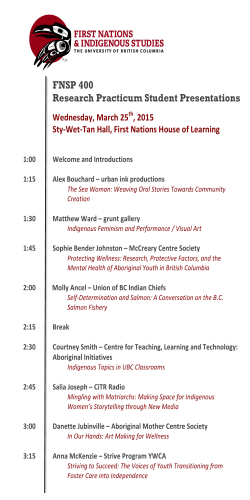
Background information - Human Rights Law Centre
High Court case against NT Government Background information 27 March 2015 How the laws work The Police Administration Amendment Act 2014 commenced on 17 December 2014. It amends the Police Administration Act by giving police new powers to detain someone for four hours (or longer if they are intoxicated) if they reasonably believe the person has committed, or is about to commit, an ‘infringement notice offence’. ‘Infringement notice offence’ is a new term that refers to specific offences under the Summary Offences Act, the Liquor Act, and the Misuse of Drugs Act. Offences covered include those that can be dealt with by way of an infringement notice, such as: Offensive conduct Undue noise Failing to keep a front yard clean Causing annoyance to another person Disturbing the public peace Singing an obscene song Using profane language Abandoning a refrigerator or ice chest Playing a musical instrument so as to annoy Leaving dead animals in a public place Consuming liquor within a public restricted area Attempting to re-enter a licensed premises within 12 hours of being removed, and Possessing a small amount of cannabis oil, resin or seed. The new detention powers are unique in Australia. Police have existing powers to detain someone for the purposes of questioning and investigation, or to bring them before a judicial officer as soon practicable so that they can have their detention reviewed and possibly apply for bail. People are usually provided with the opportunity to speak to a lawyer. There are also existing laws which allow someone to be detained if they are a risk to themselves or others, for example when seriously intoxicated. In contrast, under these new powers police are not required to: Bring the person before a bail justice as soon as reasonably practicable Charge the person at the end of the four hour detention Issue them with an infringement notice, and/or Provide them with the opportunity to receive legal advice. There is no hearing by any court nor any requirement that the offence be proved beyond reasonable doubt, which is the normal standard of proof required in criminal cases. Police can simply detain someone if they reasonably believe that they have committed or are about to commit one of many infringement notice offences. By way of example, the laws give police the power to detain someone for four hours if they believe someone has used profane language so as to offend; failed to turn their music down after police requested them to do so; or left the tap open on a public drinking fountain, resulting in water being wasted. Why we argue the laws are invalid NAAJA will argue that the laws are invalid under the Australian Constitution for two reasons. First, traditionally only a court can detain people, save for well-established exceptions. Second, the laws undermine or interfere with the integrity of the courts of the Northern Territory. The plaintiff The plaintiff in the case is the North Australian Aboriginal Justice Agency (NAAJA) - the Aboriginal Legal Service in the Top End. NAAJA is the largest legal service in the Northern Territory and provides assistance in over 10,000 legal matters a year. NAAJA exclusively represents Aboriginal and Torres Islander people. Many of their clients experience high rates of disadvantage including homelessness, ill health and unemployment. More information on NAAJA is available here: http://www.naaja.org.au The legal team The HRLC is coordinating a pro bono legal team made up of lawyers from law firm Ashurst and barristers Mark Moshinsky QC, Kathleen Foley and Chris Tran. More information on the HRLC is here: http://hrlc.org.au NAAJA is being supported in this case by IMF Bentham through its pro bono program. Why this case is important The case will ask the High Court to rule on important questions relating to the limits of police powers of detention. Further, the laws are operating in the context of the Northern Territory having the highest imprisonment rate in the country. Aboriginal people comprise over 85% of the prison population despite only comprising 30% of the general population. At a time when the Northern Territory Government should be taking steps to reduce the number of Aboriginal people in prison and police custody, these laws will inevitably result in more Aboriginal people being locked up for minor offences. This will create further injustice and increased risks of deaths in custody. FAQs Q. What outcome is NAAJA seeking? A: For the laws to be declared invalid by the High Court. Q: Are the laws being used often? A: Because the laws exclude judicial oversight, and do not provide for access to lawyers, it is unclear how often they are being used and in what circumstances. Q: When will the case be decided? A: The timetable for the case is for the Court to determine. We hope that it will possible for the matter to be heard this year. The Northern Territory Government’s Second Reading Speech can be found here: http://www.austlii.edu.au/au/legis/nt/bill_srs/paab2014317/srs.html For further information or media comments, please contact: Ruth Barson, Senior Lawyer at the Human Rights Law Centre on 0417 773 037
© Copyright 2026











